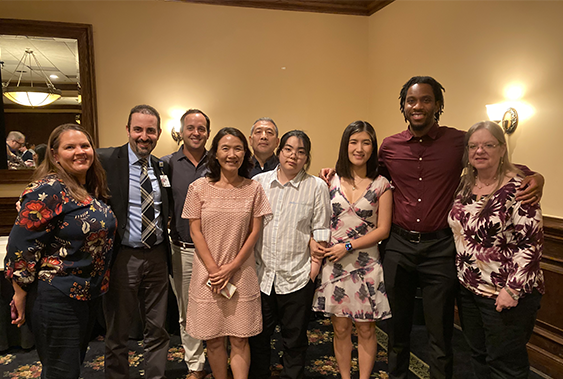Formulating an innovative approach to IT pharmacy residency.
Not too long ago, getting a prescription filled meant taking a physician’s hand-written piece of paper, driving to the pharmacy and waiting for the pharmacist to fill it.
Today, physicians prescribe medications electronically, and often, the prescription is ready by the time you drive to the pharmacy. New technologies have really advanced in this area to provide more convenience for our patients and less manual work for our clinical teams.
Houston Methodist is also taking technology to the next level with the pharmacy informatics residency program. Launched in 2019, this progam is one of just five in the world. And, it recently received an eight-year accreditation – the longest possible for any residency, a testament to the strength of this program. During the two-year residency, pharmacists learn to use technology to develop tools that make medications safer for our patients.

“The pharmacy informatics residency program fits well with our Houston Methodist education mission, helping us keep up with technology,” said Dr. Dan Metzen, PharmD, MBA, system director of pharmacy. “It contributes to the body of research for pharmacy and challenges us on how we can improve care for our patients.”
Our first resident graduated and hired.
Exploring technology innovations, identifying tools useful for patient care and adapting the technologies to health care — this is the essence of the pharmacy informatics residency program.
“Residents in the program study critical patient care initiatives and develop new technologies that provide safer medication practices,” said Dr. Ghalib Abbasi, PharmD, MS, MBA, system director of pharmacy informatics, who identified the need for the program and developed it. “A unique aspect of this program is that you’re training and certifying highly qualified professionals as pharmacy informaticists who can troubleshoot issues, as well as develop and pioneer the latest technology systems.”
The first resident to graduate, Dr. Wenfei Wei, PharmD, is paving the way for this signature program that trains pharmacists nationally and globally. Following graduation, Wei joined HM, and she’s using what she learned to continue developing pharmacy technology innovations.
Wei praised the residency’s supportive training environment. “This program has an incredible team, with everyone cheering for you to be successful,” she said. “It’s a very positive environment, and also rigorous. This is one of the top hospitals in the world, with a lot of research and the newest technology. You can make the most of the opportunity and have the the resources to back you up.”
One research initiative that captured Wei’s interest involved improving pharmacy inventory processes, something that ensures we have all the right medications on hand for all patients, and enhances HM financial performance. Wei’s training also included learning to master data analysis, statistical methodology, analytical thinking and problem-solving approaches.
“I developed a strong interest in inventory and reporting, in terms of managing the inventory most effectively,” Wei said. “This is an area where I can make an important contribution that helps patients.”
Improving patient care with technology.
One example of a technological advance that the pharmacy informatics program developed, in partnership with the Epic Orders team, was electronic prior authorization of prescriptions. Wei used this in clinical research studies during her residency training.
With electronic prior authorization, your hospital-prescribed medications, requiring special authorization, electronically route for insurance approval, meaning you can just go to your local CVS, Walgreens or other pharmacy and pick up your prescriptions. Before this, insurance approvals were done by hand, phone or fax, which was time-consuming and difficult to complete – meaning you had to wait to pick up your medications, increasing the chance of medication nonadherence.
Abbasi continued, “When we deploy technology into clinical practice, it includes trouble-shooting medical management systems, preventing drug interactions, monitoring allergies and issuing advisories to alert clinicians of potential adverse effects for patients.”
Another innovation the program developed is using smart glasses to better enhance pharmacy operations tasks such as unit inspections. You may be familiar with Google glasses, and the Iristick glasses function similarly. They’re used exclusively by our pharmacy to provide more accurate results, and they’re also hands-free. Pharmacy staff can take photos and issue voice commands to perform assigned tasks. With this technology, all the paperwork is completed electronically by the time the inspection is complete
“We’re the first organization in the United States to use these smart glasses in a health care system pharmacy,” Abbasi said.
Pharmacy innovations. Better patient care.
Hand-written prescriptions have faded into the past, replaced by safer and more efficient electronic prescribing practices. As medical and technology innovations continue improving patient care, the pharmacy informatics residency program is establishing itself as an important innovative venue for improving patient care. More information about the program can be found here.
